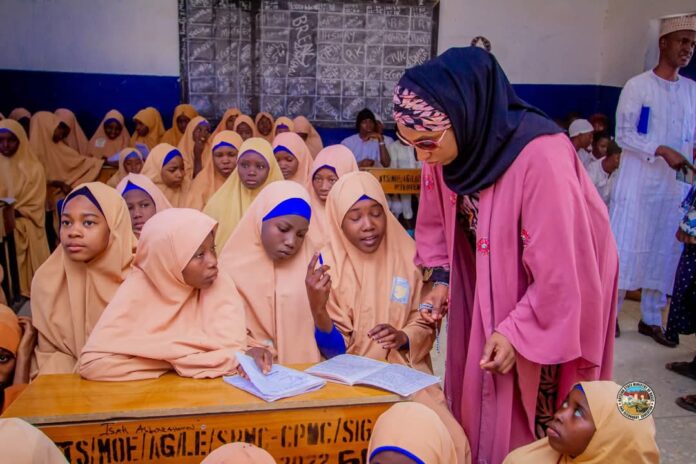@Ibrahim Kaula Mohammed
Should in case it hasn’t come to your screen or you’ve not been informed. Something remarkable is happening in Katsina’s education. Walk into classrooms across the state today, and you’ll see some developments that were unimaginable just years ago – students tracking climate patterns on tablets, girls coding under solar panels, and teachers using real-time data to tailor lessons to each child’s needs.
Behind this quiet indelible mark stands a woman whose passion for education is matched only by her pragmatic approach to solving decades-old problems – Commissioner Hajiya Zainab Musa Musawa.
In yesteryears, we were talking about a system where teachers couldn’t be sure if they’d have chalk the next day. Now we’re talking about digital IDs and solar classrooms. It’s like we skipped twenty years overnight. All for our education to be better. For our children to receive a top-notch education and better compete with their counterparts in any part of the world.
More over, working alongside Governor Dikko Umaru Radda, Musawa has orchestrated what many are calling Katsina’s education revival– a systematic overhaul that blends cutting-edge technology with deep respect for local traditions.
The scale of transformation is staggering. In less than two years, Musawa’s ministry has standardized practices across 150 new schools, deployed over 300 monitoring devices, and implemented Katsina’s first-ever digital student registration system.
Before, if a child changed schools, their records might as well have disappeared into thin air. Now, each student has their own digital identity that follows them anywhere in the state. This might sound routine in wealthier states, but in a region where paper records were the norm just months ago, it’s revolutionary.
What impresses most about Musawa’s approach is her refusal to implement change from the top down. Instead, she mobilized communities to take ownership of their schools. A bottom up approach which is tailored towards what most community development experts advocated.
Perhaps Musawa’s greatest skill lies in her ability to blend innovation with cultural sensitivity. Under her guidance, Katsina isn’t blindly importing education models from elsewhere – it’s creating its own from within.
The “From Farm to Kitchen” initiative is one of the perfect matches for this approach. Rather than simply addressing hunger through conventional feeding programs, Musawa has equipped boarding schools with seeds and farming tools, allowing students to grow their own food while learning agricultural skills central to Katsina’s heritage. Perhaps I need to reinform you about 70% – 80% residents of the State engage in farming.
I must say that even our grandparents were farmers who understood the land. Now our children learn science by planting crops and mathematics by calculating yields. It connects them to who we are while preparing them for tomorrow. Stylishly our students are using one stone to kill two birds at a time.
Governor Radda’s N120 billion education investment since 2023 – the largest in the state’s history – has given Musawa the resources to match her vision. The numbers tell a compelling story. Let’s give it a deeper look altogether, 7,000 new teachers recruited, 75 schools completed and 75 more under construction, N6.6 billion for digital learning tools and girls’ scholarships.
But statistics alone don’t capture the human impact. In Funtua, I met Fatima, a 14-year-old who speaks with startling clarity about her future. “Before, girls like me had one path. Now I’m learning to code. School lets me rewrite my destiny.”
Her words crystallize what makes Musawa’s leadership so effective – she understands that education isn’t just about literacy rates or exam scores. It’s about giving children the power to imagine different futures.
Put that as it may, Musawa’s pragmatism shines through in her approach to partnerships. Rather than reinventing wheels, she’s leveraged relationships with UNESCO, UNICEF, and the Oando Foundation to multiply her ministry’s efforts.
Through the EU-UNESCO EISS Project, 20,000 teachers are receiving modern pedagogical training. UNICEF’s collaboration has already re-enrolled 4,000 girls and provided literacy and vocational training to 6,000 more.
A woman with clear-cut direction. She deals with data, clear plans, and skin in the game. That makes international organizations like UNICEF, UNESCO among others eager to collaborate.
As solar panels light up classrooms that once went dark at sunset and girls who might have been married off now discuss career paths, Katsina is writing a new chapter in its educational history.
Hajiya Zainab Musawa is transforming lives through learning. She’s not just educating children; she’s healing generations. For a state determined to transform itself through learning, no better hands could hold the education portfolio than Musawa. With her, the state education is travelling on a greater height.
Ibrahim Kaula Mohammed
is the Chief Press Secretary to the Governor of Katsina State.




